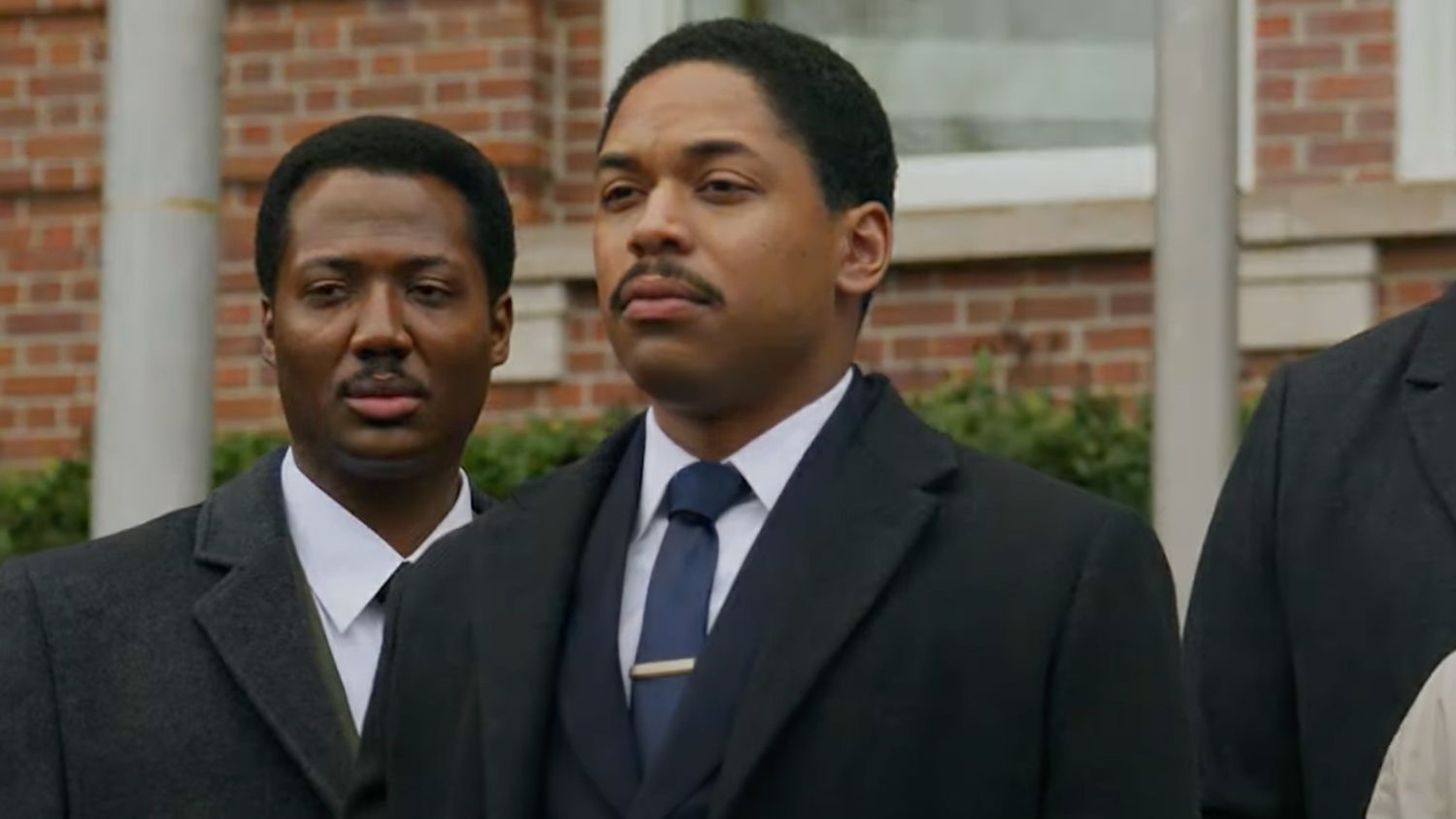Fact vs Fiction: Genius: MLK/X episode 4 — who stabbed Martin Luther King Jr?
Plus, what happened with Malcolm X and his interview with Louis Lomax and Mike Wallace?

In Genius: MLK/X episode 4, Martin Luther King Jr. (Kelvin Harrison Jr.) faces an unexpected trauma when he's stabbed at a book signing in Harlem. Although he survives, the event takes a dramatic toll on him. Elsewhere, Malcolm X (Aaron Pierre) tries to spread the message of the Nation of Islam to the masses via a television special. Unfortunately, the footage leads to unintended consequences.
Was this all true or were there some things fictionalized for the series? Here's everything that we found out.
Who stabbed Martin Luther King Jr.?

The fiction
It's 1958, and King and Ralph Abernathy (Hubert Point-Du Jour) are in Harlem at King's book signing. Things are going well with a good crowd of people present when a woman approaches him and asks if King has been conspiring with the communist party. King is taken aback by the question, but before he can seek clarification, she stabs him in the chest with a letter opener. Afraid he may bleed out, Abernathy insists no one remove the weapon from King's body.
The episode then cuts to King alive and well back in his home in Atlanta.
The fact
According to The Martin Luther King, Jr. Research and Education Institute at Standford, on September 20, 1958, 42-year-old mentally ill Izola Ware Curry went to see King at his book signing at the Blumstein's Department Store in Harlem, New York. Approaching the Civil Rights leader, she had a seven-inch steel letter opener in her hand and lunged it into the upper left side of his chest.
King was immediately taken to Harlem Hospital and underwent a two-hour surgery. Doctors allegedly stated, "Had Dr. King sneezed or coughed, the weapon would have penetrated the aorta.… He was just a sneeze away from death."
After being arrested and charged, Curry reportedly stated, "I'm charging him [King] as well as he's charging me … I'm charging him with being mixed up with the communists." She claimed there was a dangerous connection between communists and Civil Rights leaders, and they were to blame for her losing her job and forcing her to change her religion.
Get the What to Watch Newsletter
The latest updates, reviews and unmissable series to watch and more!
Curry would not be declared competent to stand trial and diagnosed as a paranoid schizophrenic.
Did Adam Clayton Powell Jr. threaten Martin Luther King Jr. and Bayard Rustin?
The fiction
Bayard Rustin (Griffin Matthews) is fully committed to helping King and the Southern Christian Leadership Conference in their fight against the segregationist powers that be. They devise a plan to protest the 1960 Democratic Convention, claiming the party hadn't done enough to help the cause and failed to commit to doing dramatically more.
Planning for the event is full steam ahead when King receives a mysterious, yet troubling, letter. He later reveals to Rustin the note was from Congressman Adam Clayton Powell Jr., and the elected official is threatening to tell the press that King and Rustin are engaged in a homosexual affair if the planned protest of the convention isn't canceled.
Rustin finds the warning preposterous, but is willing to step away from protest to neutralize Powell's threat. Instead of fighting to keep Rustin on board, King accepts Rustin's resignation, to Rustin's chagrin.
The fact
The History Channel reports that Rustin met King in Montgomery, Ala., in 1956 during the Bus Boycotts to lend his support and expertise. King was aware of Rustin's sexual orientation and his previous arrests, but the reverend wasn't necessarily bothered. Instead, he was impressed by Rustin's ability to organize and strategize.
Rustin's sexuality and past didn't present a problem until it came to the 1960 Democratic Convention. He was working with King and the Southern Christian Leadership Conference to protest the event, and then as the History Channel puts it:
"Prior to the convention, Powell sent an intermediary to threaten King, telling him that if they proceeded with the march, he would accuse King of having an affair with Rustin, not only killing the march but also dealing a possibly fatal blow to the movement as a whole."
Although Rustin did resign, King confidante, Clarence Jones, told Powell if he didn't back down, Jones would spread photos and posters in Harlem of all the women Powell allegedly slept with. Wanting to maintain an image in his district, Powell backed down and King led a protest at the convention anyway.
King and Rustin would eventually come to work together again.
What happened with Malcolm X, Louis Lomax and the Mike Wallace 1959 interview?

The fiction
Malcolm X comes up with the idea that the message of the Nation of Islam needs to reach more people. To do so, he speaks with Louis Lomax (Jared Wofford), a reporter who works with highly-esteemed Mike Wallace about a TV special. The Civil Rights leader and Lomax come to an agreement that Lomax and his crew will have access to the temple, but Lomax warns Wallace will have the final edit. The event takes place before Elijah Muhammad can give his approval, but Malcolm X eventually persuades him to agree that the spotlight could benefit the Nation.
Unfortunately, when the special airs, Malcolm X becomes angry as it makes it look as if the Nation is a community of "Black supremacists." Furthermore, Muhammad seems concerned that a newspaper article later refers to the interview and calls the group, "The Nation of Malcolm."
The fact
The event in question aired in 1959 and was titled "The Hate that Hate Produced." We've included the interview below, but it certainly aligns the Nation as a hate group.
It appears there were a number of critics of the interview who thought it was biased against Malcolm X, Muhammad and the Nation. However, it's worth noting it also skyrocketed Malcolm X in the public eye, and as reported by NPR, Malcolm would go on to sit with Mike Wallace directly for an on-camera interview in 1964.
Episodes of Genius: MLK/X continue to air on Thursdays on National Geographic and become available on Fridays on Hulu and Disney Plus.
Terrell Smith has a diverse writing background having penned material for a wide array of clients including the federal government and Bravo television personalities. When he’s not writing as Terrell, he’s writing under his pseudonym Tavion Scott, creating scripts for his audio drama podcasts. Terrell is a huge fan of great storytelling when it comes to television and film. Some of his favorite shows include Abbot Elementary, Matlock, The Lincoln Lawyer, Survival of the Thickest, The Pitt and Godfather of Harlem. And a fun fact is he's completely dialed into Bravo Universe and The Young and the Restless (thanks to his grandmother).











